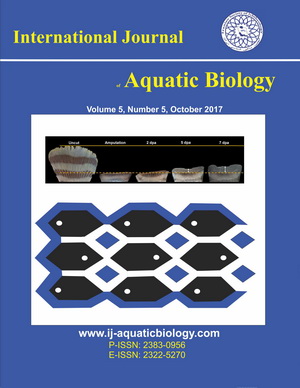Hormonal failure and osmoregulatory disruption in laboratory food-deprived Caspian kutum, Rutilus frisii larvae during brackish water challenge
Downloads
Caspian Kutum, Rutilus frisii, is a valuable species in the Caspian Sea basin. With the aim of restocking, the Iranian Fisheries Organization (IFO) annually released millions of Caspian kutum larvae into the estuaries of the Caspian Sea. This study was conducted to evaluate the effects of starvation on fish during Caspian seawater (CSW) adaptation. Caspian kutum larvae (0.5±0.1 g) were divided into two groups; one was considered a control fed ad libitum during the experiment and another group was left food deprived. Both groups were continuously exposed to the CSW challenge (13 ppt) for 7 days and sampling was done on the second, third, fourth and seventh days after initiation of the CSW challenge. Different physiological factors, including hormones (cortisol, T3, and T4), gill Na+/K+-ATPase activity, whole body glucose and protein, gill protein, body moisture, and seawater preferences, were analyzed in each sampling time. The results showed that although fed larvae can successfully overcome the physiological changes imposed by the CSW challenge, the starved fish indicated significant failures in the most measured parameters and eventually demonstrated significantly lower salinity preferences. Therefore, it can be concluded that starvation may negatively affect the success of CSW adaptation. Since physiological impairment during the CSW adaptation period is directly related to the effectiveness of the restocking program, more studies about the feeding condition of Caspian kutum larvae pre and post-releasee and the nutritional status of recipient rivers are suggested.
Downloads
Aas-Hansen Ø., Johnsen H.K., Vijayan M.M., Jørgensen E.H. (2003). Development of seawater tolerance and concurrent hormonal changes in fed and fasted Arctic charr at two temperature regimes. Aquaculture, 222(1-4): 135-148.
Afraei B., Mashhor M., Abdolmalaki S., Keymaram F., Mansor M..I, Janbaz A.A. (2010). Age and growth of kutum (Rutilus frisii kutum, Kamensky, 1901) in southern Caspian Sea. International Aquatic Research, 2(1): 25-33.
Arjona F.J., Ruiz-Jarabo I., Vargas-Chacoff L., del Río M.P.M., Flik G., Mancera J.M., Klaren P.H. (2010). Acclimation of Solea senegalensis to different ambient temperatures: implications for thyroidal status and osmoregulation. Marine Biology, 157(6): 1325-1335.
Bastami K.D., Shabani N., Soltani F., Afkhami M. (2012). A survey on ionic and metabolite factors of blood serum in kutum (Rutilus frisii kutum). Comparative Clinical Pathology, 21(6): 1193-1195
Bradford M.M. (1976). A rapid and sensitive method for the quantitation of microgram quantities of protein utilizing the principle of protein-dye binding. Analytical Biochemistry, 72(1-2): 248-254.
Costas B., Aragao C., Ruiz-Jarabo I., Vargas-Chacoff L., Arjona F.J., Dinis M.T., Mancera J.M., Conceicao LE. (2011). Feed deprivation in Senegalese sole (Solea senegalensis Kaup, 1858) juveniles: effects on blood plasma metabolites and free amino acid levels. Fish Physiology and Biochemistry, 37(3): 495-504.
Deal C.K., Volkoff H. (2020). The role of the thyroid axis in fish. Frontiers in Endocrinology 11: 585-596.
Eagderi S., Mouludi-Saleh A., Esmaeili H.R., Sayyadzadeh G., Nasri M. (2022). Freshwater lamprey and fishes of Iran; a revised and updated annotated checklist-2022. Turkish Journal of Zoology 46(6): 500-522.
Ebrahimi G., Ouraji H. (2012). Growth performance and body composition of kutum fingerlings, Rutilus frisii kutum (Kamenskii 1901), in response to dietary protein levels. Turkish Journal of Zoology, 36(4): 551-558.
Enayat Gholampoor T., Imanpoor M., Shabanpoor B., Hosseini S. (2011). The Study of Growth Performance, Body Composition and Some Blood Parameters of Rutilus frisii kutum (Kamenskii, 1901) Fingerlings at Different Salinities. Journal of Agricultural Science and Technology, 13: 869-876.
Evans D.H, Piermarini P.M., Choe KP. (2005). The multifunctional fish gill: dominant site of gas exchange, osmoregulation, acid-base regulation, and excretion of nitrogenous waste. Physiological Reviews, 85(1): 97-177.
Grosell M. (2010). The role of the gastrointestinal tract in salt and water balance. Fish Physiology, 30: 135-164.
Hasanpour S., Eagderi S., Hosseini S.V., Sayadi M.H.J. (2016). Histological and allometric growth analysis of eye in Caspian kutum, Rutilus kutum Kamensky, 1901 (Teleostei: Cyprinidae) during early developmental stages. International Journal of Aquatic Biology, 4(4): 295-300.
Hosseini S.A., Saad C.R., Bourani M., Daud H., Harmin S. (2012). Effect of weight on osmoregulation ability in Rutilus frisii kutum fingerlings. African Journal of Biotechnology, 11(12): 3014-3021.
Jafari M., Kamarudin M.S., Saad C., Arshad A., Oryan S., Bahmani M. (2009). Development of morphology in hatchery-reared Rutilus frisii kutum larvae. European Journal of Scientific Research, 38(2): 296-305.
Jürss K., Bittorf T., Vökler T., Wacke R. (1983). Influence of nutrition on biochemical sea water adaptation of the rainbow trout (Salmo gairdneri Richardson). Comparative Biochemistry and Physiology Part B: Comparative Biochemistry, 75(4): 713-717.
Jürss K., Bittorf T., Vökler T., Wacke R. (1984). Biochemical investigations into the influence of environmental salinity on starvation of the tilapia, Oreochromis mossambicus. Aquaculture, 40(2): 171-182.
Laiz-Carrion R., Sangiao-Alvarellos S., Guzmán J.M., Del Río M.P.M., Míguez J.M., Soengas J.L., Mancera J.M. (2002). Energy metabolism in fish tissues related to osmoregulation and cortisol action. Fish Physiology and Biochemistry, 27(3-4): 179-188.
Laiz-Carrion R., Sangiao-Alvarellos S., Guzmán J.M., Martín del Río M.P., Soengas J.L., Mancera J.M. (2005). Growth performance of gilthead sea bream Sparus aurata in different osmotic conditions: Implications for osmoregulation and energy metabolism. Aquaculture, 250(3-4): 849-861.
Lerner D.T., Björnsson B.T., McCormick S.D. (2007). Effects of aqueous exposure to polychlorinated biphenyls (Aroclor 1254) on physiology and behavior of smolt development of Atlantic salmon. Aquatic Toxicology, 81(3): 329-336.
López-Bojórquez L., Villalobos P., García-G C., Orozco A., Valverde-R C. (2007). Functional identification of an osmotic response element (ORE) in the promoter region of the killifish deiodinase 2 gene (FhDio2). Journal of Experimental Biology, 210(17): 3126-3132.
Madsen S., Jensen M., Nhr J., Kristiansen K. (1995). Expression of Na (+)-K (+)-ATPase in the brown trout, Salmo trutta: in vivo modulation by hormones and seawater. American Journal of Physiology-Regulatory, Integrative and Comparative Physiology, 269(6): R1339-R1345.
Madsen S., Korsgaard B. (1989). Time?course effects of repetitive oestradiol?17? and thyroxine injections on the natural spring smolting of Atlantic salmon, Salmo salar L. Journal of Fish Biology, 35(1): 119-128.
Madsen S.S., Weber C., Nielsen A.M., Mohiseni M., Bosssus M.C., Tipsmark C.K., Borg B. (2015). Sexual maturation and changes in water and salt transport components in the kidney and intestine of three-spined stickleback (Gasterosteus aculeatus L.). Comparative Biochemistry and Physiology Part A: Molecular & Integrative Physiology, 188: 107-119.
Mancera J.M., McCormick S.D. (2019). Role of prolactin, growth hormone, insulin-like growth factor I and cortisol in teleost osmoregulation. In: Baldisserotto B. Fish Osmoregulation. CRC Press. 540 p.
Marshall W., Bryson S. (1998). Transport mechanisms of seawater teleost chloride cells: an inclusive model of a multifunctional cell. Comparative Biochemistry and Physiology Part A: Molecular and Integrative Physiology, 119(1): 97-106.
McCormick S.D. (1993). Methods for nonlethal gill biopsy and measurement of Na+, K+-ATPase activity. Canadian Journal of Fisheries and Aquatic Sciences, 50(3): 656-658.
McCormick S.D. (2001). Endocrine control of osmoregulation in teleost fish. American Zoologist, 41(4): 781-794.
McCormick S.D., O’Dea M.F., Moeckel A.M., Lerner D.T., Björnsson BT. (2005). Endocrine disruption of parr-smolt transformation and seawater tolerance of Atlantic salmon by 4-nonylphenol and 17?-estradiol. General and Comparative Endocrinology, 142(3): 280-288.
McCormick S.D., Regish M.F., O’Dea F., Shrimpton J.M. (2008). Are we missing a mineralocorticoid in teleost fish? Effects of cortisol, deoxycorticosterone and aldosterone on osmoregulation, gill Na+, K+-ATPase activity and isoform mRNA levels in Atlantic salmon. General and Comparative Endocrinology, 157(1): 35-40.
Mohiseni M., Sepidnameh M., Bagheri D., Banaee M., Nematdust Haghi B. (2017). Comparative effects of Shirazi thyme and vitamin E on some growth and plasma biochemical changes in common carp (Cyprinus carpio) during cadmium exposure. Aquaculture Research, 48(9): 4811-4821.
Moss D., Henderson A. (1999). Clinical enzymology in TITETZ textbook of clinical chemistry. Philadelphia: WB Saunders Company. 1919 p.
Moustakas C.T., Watanabe W.O., Copeland K.A. (2004). Combined effects of photoperiod and salinity on growth, survival, and osmoregulatory ability of larval southern flounder Paralichthys lethostigma. Aquaculture, 229(1): 159-179.
Mukhi S., Carr J.A., Anderson T.A., Patiño R. (2005). Novel biomarkers of perchlorate exposure in zebrafish. Environmental Toxicology and Chemistry, 24(5): 1107-1115.
Narayansingh T., Eales J. (1975). The influence of physiological doses of thyroxine on the lipid reserves of starved and fed brook trout, Salvelinus fontinalis (Mitchill). Comparative Biochemistry and Physiology Part B: Comparative Biochemistry, 52(3): 407-412.
Nemova N., Kaivarainen E., Rendakov N., Nikerova K, Efremov D. (2021). Cortisol Content and Na+/K+-ATPase Activity under Adaptation of Juvenile Pink Salmon Oncorhynchus gorbuscha (Salmonidae) to Salinity Changes. Journal of Ichthyology, 61(5): 771-778.
Nikoo M., Langroudi H.F., Molla A.E. (2010). Serum steroid hormones in kutum Rutilus frisii kutum during spawning season. International Aquatic Research, 2(2): 131-133.
Ouraji H., Khalili K.J., Ebrahimi G., Jafarpour S.A. (2011). Determination of the optimum transfer time of kutum (Rutilus frisii kutum) larvae from live food to artificial dry feed. Aquaculture International, 19(4): 683-691.
Pavlidis M., Berry M., Divanach P., Kentouri M. (1997). Diel pattern of haematocrit, serum metabolites, osmotic pressure, electrolytes and thyroid hormones in sea bass and sea bream. Aquaculture International, 5(3): 237-247.
Peter M.S., Lock R.A., Bonga S.E.W. (2000). Evidence for an osmoregulatory role of thyroid hormones in the freshwater mozambique tilapia Oreochromis mossambicus. General and Comparative Endocrinology, 120(2): 157-167.
Peter M.S., Peter V.S. (2009). Action of thyroid inhibitor propyl thiouracil on thyroid and interrenal axes in the freshwater tilapia, Oreochromis mossambicus Peters. Journal of Endocrinology and Reproduction, 13: 37-44.
Peterson B.C., Booth N.J. (2010). Validation of a whole-body cortisol extraction procedure for channel catfish (Ictalurus punctatus) fry. Fish Physiology and Biochemistry, 36(3): 661-665.
Polakof S., Arjona F.J., Sangiao-Alvarellos S., Martin del Rio M.P., Mancera J.M., Soengas J.L. (2006). Food deprivation alters osmoregulatory and metabolic responses to salinity acclimation in gilthead sea bream Sparus auratus. Journal of Comparative Physiology B, 176(5): 441-452.
Salehi H. (2008). Benefit-cost analysis for fingerling production of kutum Rutilus frisii kutum (Kamensky, 1901) in 2005 in Iran. Aquacult. Asia Magazine, 9: 35-39.
Samarin A.M., Amiri B.M., Soltani M., Nazari R.M., Kamali A., Naghavi M.R. (2011). Effects of post-ovulatory oocyte ageing and temperature on egg quality in kutum Rutilus frisii kutum. World Applied Sciences Journal, 15(1): 14-18
Sangiao-Alvarellos S., Arjona F.J., Martin del Rio M.P., Miguez J.M., Mancera J.M., Soengas J.L. (2005). Time course of osmoregulatory and metabolic changes during osmotic acclimation in Sparus auratus. The Journal of Experimental Biology, 208(Pt 22): 4291-4304.
Sangiao-Alvarellos S., Laiz-Carrión R., Guzmán J.M., del Río M.P.M, Miguez J.M., Mancera J.M., Soengas J.L. (2003). Acclimation of S. aurata to various salinities alters energy metabolism of osmoregulatory and nonosmoregulatory organs. American Journal of Physiology-Regulatory, Integrative and Comparative Physiology, 285(4): R897-R907.
Shafiei Sabet S., Imanpoor M.R., Fatideh B.A. (2010). Relation between gonadal hormones and sexual maturity of female Kutum Rutilus frisii kutum during spawning season. Journal of Cell and Molecular Research, 1(2): 96-105.
Stefansson S.O., Imsland A.K., Handeland S.O. (2009). Food-deprivation, compensatory growth and hydro-mineral balance in Atlantic salmon (Salmo salar) post-smolts in sea water. Aquaculture, 290(3-4): 243-249.
Taylor J.R., Grosell M. (2006). Feeding and osmoregulation: dual function of the marine teleost intestine. The Journal of Experimental Biology, 209(Pt 15): 2939-2951.
Webb N., Shaw J., Morgan J., Hogstrand C., Wood C. (2001). Acute and chronic physiological effects of silver exposure in three marine teleosts. Aquatic Toxicology, 54(3): 161-178.
Copyright (c) 2023 International Journal of Aquatic Biology

This work is licensed under a Creative Commons Attribution 4.0 International License.








